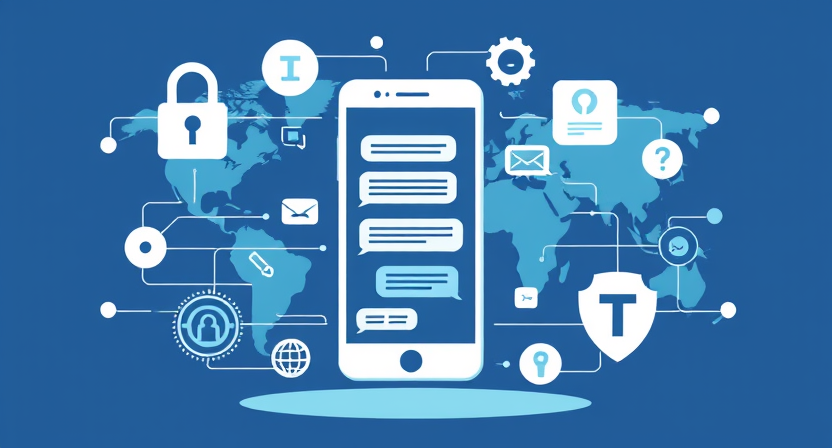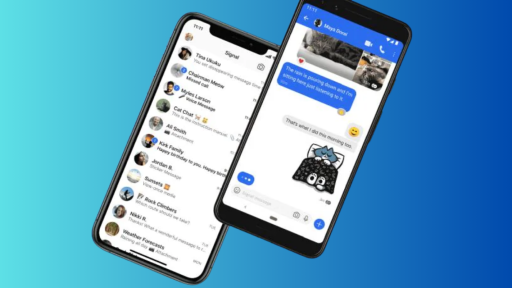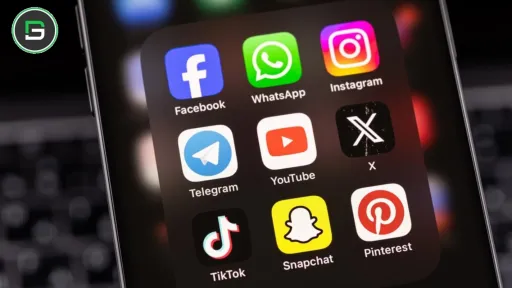Have you ever heard that more than 5 billion text messages are sent every day? Given that there is a lot of sensitive information being exchanged, how many of these conversations are even really secure?
The need for secure communication has been more important in the current world than any time in history. Unlawful invasions of personal privacy, threats from hackers, and other unauthorized access to people’s information is fast becoming a worrying trend. Whether you are active on a particular application or a business communication that can take place with your co-workers, the selection of an online chat app can be very important to ensure the security of your account data.
In this article, we go deeper into secure messaging and look to unravel the best chat applications in the current world. In this article, we’ll describe them, their main strengths and weaknesses, security options, and usability for different categories of users to simplify your choice of which of them can provide protection for your messages.
The Importance of Secure Messaging
Privacy in the Digital Age
With such a society emerging, privacy has emerged as one of the biggest and most prominent issues of the society. By now, messaging platforms are quite flexible to the extent that people use them for casual conversations and even for business talks. But the contemporary world of hackers and data leaks has proved that our talks can be as insecure as it gets. For example, the recent leak in 2021 with Facebook data where phone numbers and other users’ personal information of over 500 million people are at risk requires secure messaging.
End-to-End Encryption (E2EE)
In this case, the most crucial capability of a secure messaging app is the capability to support End-to-End Encryption (E2EE). This technology makes it possible for messages to be encrypted on the sender’s phone and no other person can decrypt it. Not even servers that host the app or administrators of the app, can view the content of the messages. Signal or WhatsApp come with E2EE that makes it extremely hard for anyone to eavesdrop on your conversations. If E2EE isn’t implemented then your messages are prone to interception by anyone including hackers or other unauthorized personnel.
Legal and Personal Risks
If insecure messaging is endangered, the consequences do not remain on paper only but are evident in scenarios. One’s personal information has been stolen leading to identity theft and corporate business losses due to espionage from hacked messages. For example, in 2014 cyber criminals attacked Sony Pictures and stained the emails, financial records, and even movies; this is rather an example of the consequences of inadequate communication protection. In a more individualistic and personal capacity insecure platforms have been used to steal personal information and thus blackmail, fraud or even reputational damage.
But by picking an app that fosters privacy in online chat then the above risks can be avoided and people can chat knowing that their information is safe.
Key Criteria for Choosing a Secure Messaging App
Encryption Protocols
Encryption is the foundation of any secure messaging app. It works by converting readable messages into encoded formats that can only be decrypted by the intended recipient. Among the various encryption methods, the Signal Protocol is widely regarded as the gold standard. Used by apps like Signal and WhatsApp, this open-source encryption framework ensures end-to-end encryption (E2EE) by default, preventing anyone—including app providers and hackers—from accessing the message contents. When evaluating the best chat app for security, always check whether it employs robust encryption protocols like Signal Protocol.
Data Collection Policies
Although your messages are protected by encryption, your app may still snoop on metadata and the details of your communication. There exists a wide spectrum of implementations of secure messaging platforms in terms of metadata and user data handling. For instance, Signal data collects any data while WhatsApp, which is owned by Meta, stores such information as phone contacts, and device details. Also, it is recommended to select the apps staying as clear as possible on how they operate and what data they gather and, if possible, avoid storing information not needed.
Cross-Platform Compatibility
The immediate requirement for users in today’s multi-device environment is the ability to move seamlessly between different devices – phones, tablets and computers to access their message applications. That means an ideal app should enhance the privacy of its users along with being compatible with other platforms without a compromise in security. When users are on the iOS, Android or if they are on desktops, the way they can use the app should be similar since it should allow users to securely connect with other users.
Extra Features
Beyond the basics of encryption and data privacy, additional features can greatly enhance security and usability. For example:
Self-Destructing Messages: Apps like Telegram and Signal allow messages to delete themselves after a set time, leaving no trace behind.
Password Protection: Some apps offer a lock feature to prevent unauthorized access, even if someone gains physical access to your device.
Two-Factor Authentication (2FA): This adds an extra layer of security by requiring a second form of verification (e.g., a code sent to your phone) before accessing your account.
By considering these criteria, users can make informed decisions about which online chat app offers the best balance of privacy, security, and functionality.
Top Secure Messaging Apps: Features and Comparisons
1.Signal
Pros:
Open Source: Different codes are publicly available which in turn makes it easier for security experts to audit Signal’s code to ensure a secure application.
E2EE by Default: All voice and video calls are encrypted from end-to-end using the incredibly secure and open-source Signal Protocol.
Minimal Data Collection: Signal keeps almost no user information—phone number is the only information needed to sign up, thus, the app is one of the most private ones.
Cons:
Limited Features: Signal is significantly less feature-rich; it has none of the toys, like stickers, and several of the whistles, like complicated groups.
Requires a Phone Number: The only available output field is a user identification number which, while it enables anonymity, may discourage users who prefer complete anonymity.
Best For:
Signal is perfect for people who care a lot about their privacy and don’t need all the extra fluff. Clean and uncluttered look combined with an extreme focus on the privacy of its users makes it the perfect solution for those who want clean and unfiltered communication.
Pros:
Popular: WhatsApp is popular throughout the world and is used by more than 2 billion of users worldwide; therefore, it is simple to find almost any person.
E2EE: Everything we send is protected end-to-end by default, including messages, voice and video calls.
User-Friendly: Being user-friendly, it engages the audience who prefer simple designs; has no spaces for lags and technical issues when it comes to sharing multimedia content with friends; and features quite comfortable group chats options.
Cons:
Owned by Meta: Still, WhatsApp has an owner in Meta (formerly Facebook), and the company has many scandals connected with the leakage of personal information.
Collects Metadata: Your messages are safe but this app takes metadata including phone number, information about device and communication details which might be an issue for many people.
Best For:
WhatsApp is ideal for ordinary users who need simple, yet safe, applications for messaging. It has become one of the most used because of the stable functions for healthy communication, but some specific people may need to choose applications with stricter approaches to data sharing.
Telegram
Pros:
Secret Chats with E2EE: Secret Chats option in Telegram include end to end encryption to guarantee a secure conversation.
Large Group Chats: Telegram allows creation of such groups with a maximum of 200,000 people, so it is suitable for activities that presuppose wide-spread communication and cooperation.
Cloud-Based Storage: Chats are saved only on the cloud and can be accessed across different devices with convenience leaving the messages and media safe.
Cons:
Default Chats Are Not E2EE: Chats on Telegram include server to client encryption as a result, they can, in theory, read your messages. It is to note that Secret Chats require activation and only in that mode, the users get end-to-end encryption to the conversation.
Potential Privacy Concerns: For while Telegram is quite vocal about its end-to-end encrypted message capability, the fact that this feature is inactive for normal chats may discourage those in search of the highest levels of privacy.
Best For:
The most important advantages of Telegram are grouping options and simplicity allowing casual users with no necessity in complex features to easily communicate and switch between devices. Of course, there are users who care about the privacy of their communication and would rather use other applications that automatically enable E2EE for all types of discussions.
Threema
Pros:
No Need for Phone Numbers: Threema keeps the identity of its users unknown, as it uses Threema ID rather than the number or address of the e-mail.
Strong Anonymity: Exclusive of the connection with individual identifiers, Threema is one of the most private messaging apps one can use.
E2EE by Default: A source that contains any com,ink message, call, file, and even a status update to be encrypted end-to-end.
Minimal Data Collection: Threema was developed directly against tracking users or storing their metadata thus having maximum privacy.
Cons:
Paid App: Threema has the disadvantage of being a paid app, though once paid the messaging is free However, it has a one-time fee.
Smaller User Base: Threema has relatively fewer users compared to WhatsApp or Telegram, though this could mean that it is not very efficient in terms of connecting with the world.
Best For:
Threema will be invaluable to users interested in maintaining their privacy and anonymity, for instance, journalists, activists or employees in high-risk organizations. For the cost, this is one of the best alternatives to have your accounts controlled by and always remain anonymous if you consider security.
iMessage
Pros:
E2EE for Apple Users: iMessage is a secure messaging application provided for Apple users for end-to-end encrypted messaging so that messages remain confidential.
Integration with iOS: Integrated well with other Apple applications, iMessage runs smoothly together with other iOS applications as well as application interfaces such as facetime and siri.
Rich Features: Provides reaction, animation and other features to make the message more attractive, and it supports automatic sharing of media content to chat.
Cons:
Limited to Apple Devices: iMessage is also proprietary of Apple meaning that users of Android and other operating systems cannot encrypt messages with users with apple products.
Metadata Collection: If messages are encrypted, Apple does monitor some other data such as time messages are sent.
Best For:
iMessage can be beneficial for Apple ecosystem users who need secure and packed with essential features messaging apps. Being compatible with all sorts of Apple products, it is the solution of choice for those already using Apple-based devices. However its cross platform compatibility is missing and cannot be used to communicate with people not using the apple products.
Challenges and Limitations of Secure Messaging Apps
Usability vs. Security
Another typical problem to solve is the conflict of interest between the intuitive interface and the signal security. Signal is a secure messaging app but it has less capability that a normal user or an everyday user would want in a messaging application. On the other hand, applications like WhatsApp for their part may sacrifice more usability by harvesting metadata. The importance of this point is critical since making the processes complex is not advisable since it will only scare the nontechnical users away from the app.
User Adoption
End-to-end encrypted messaging works well when two people conversing apply the same application or service. However, this opens up a big question in the way of implementation. For example, Signal and, in particular, Threema significantly exceed other applications in the degree of privacy; at the same time, many people remain unknown to each other, and contacts are limited, and therefore, the user has to switch to more permissive services. Such fragmentation can be a problem for the objective of secure communication for as many people as possible.
Government and Regulatory Issues
It is well known that governments from all around the world urge technology companies to provide a back door in their encrypted services in order to fight terrorism and other threats. But the use of backdoors poses a threat to encryption and users are vulnerable to attacks by hackers. While companies like Signal and WhatsApp have not implemented such measures in public, there persists continuous regulatory pressure. As with any communication service, there is always a strong tension between user privacy and legal compliance for secure messaging providers.
These challenges show where the specific goals of Secure Messaging Applications creates trade-offs and debates, thus the need for user awareness and collaboration on the continued quest for privacy while not limiting easy use of such applications.
Conclusion:
Choosing the Right App for You
Unfortunately when one is communicating online especially when it involves sharing of information it is not an extra to use a secure messaging service. Even where security matters most based on a preference for end to end encryption, anonymity or cross platform compatibility, then selecting the best app has to do with one’s need whether an individual or professional. Signal is a clear choice for people who value privacy, WhatsApp is good for everyone who doesn’t want to spend much time learning new apps .
But understand that taking time off from your texting is more than likely worth it when you consider requirements whether casual talk, business or protection of vital information. From this list of recommended applications, pick the one and start using protected messages for your day to day use. The best time to start safeguarding your digital life is right now, as this gives you a good head start.
Bear in mind that the security of your organization is not a decision that can be undertaken once, but a process that is continually practiced. That is why threats and solutions are changing in accordance with the development of the digital environment. Ensure that you keep up to date with the current app, which you have chosen, and also make others embrace the idea of secure messaging. That is why, united with the rest of the modern population, we can build a safer and more private online space.





